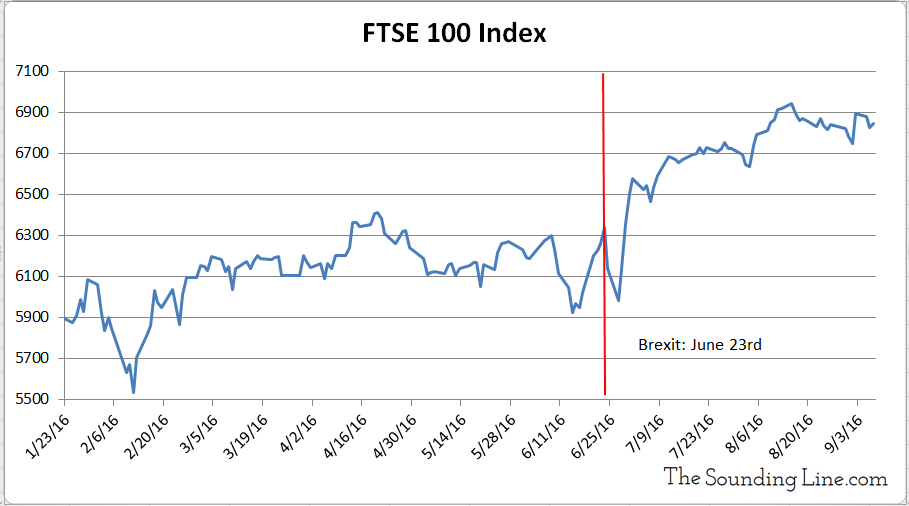Submitted by Taps Coogan on the 9th of September 2016 to The Sounding Line.
Enjoy The Sounding Line? Click here to subscribe for free.
It’s been nearly three months since the UK’s historic vote to leave the EU on June 23rd 2016. Interestingly, the event which, was billed as world changing, now appears to have fallen out of the news cycle.
While the decision by UK voters to leave the EU was a resounding defeat for the global political, media, and economic establishment, perhaps the reason for the current disinterest in the subject of Brexit’s aftermath is due to another equally important defeat now being suffered by the same establishment: the failure of Project Fear’s predictions to turn into reality for the UK.
‘Project Fear’ was the backbone of the campaign to keep the UK in the EU. It was a strategy to roll out an endless stream of established politicians, business people, and economists who made increasingly alarmist claims that a vote to leave the EU would bring economic, political, cultural, and military crisis to the UK. As the campaign drew on, the claims grew ever more exaggerated. Lest we forget, the following are a few of the claims that were made in a vain attempt to scare the UK voters from leaving the EU.
Now former Chancellor of the Exchequer George Osborne warned that job losses could start as soon as the day after the Brexit vote and effect as many as 3.3 million people (here). He went on to warn that every family in the UK would lose nearly $7,000 a year.
An endless line of economists at central banks, financial institutions, and major news outlets claimed that a Brexit vote would promptly throw the global economy into recession, crash global stock markets and currencies, cause widespread unemployment, and a slowdown in UK GDP growth by as much as 9.5% (here, here, here, here, here, here).
Now former Prime Minister David Cameron went as far as to imply that Brexit could thrust the UK into World War III (here) and perhaps the most outlandish of all was the claim by European Council President Donald Tusk “that Brexit could be the beginning of the destruction of not only the EU but also of western political civilization in its entirety” (here).
A few months later those absurd claims have fallen by the wayside. In fact, the FTSE 100, the UK’s main stock index, has risen 8% in the 53 trading days since the Brexit vote, more than twice as much as in the preceding 53 days.

Moreover, since the Brexit vote, employment has hit a record high of 74.4%, wage growth has increased (here), and the GDP growth rate for the third quarter, which accounts for the period post Brexit, is now expected to be positive (here).
It’s no surprise that economists are starting to quietly retract their predictions for gloom and doom (here).
While it is worthwhile to hold people in positions of power accountable for their false assertions, it is much more important to point out that the failure of the project fear’s predictions to come true means that the next European country that calls for independence from the EU will not be able to make the same alarmist arguments. Certainly, markets and economies around the world will rise and fall in the future, at times dramatically so, but the positive economic and market developments in the UK over the past months will make it tenuous to tie any future downturn to Brexit in and of itself.
As we have discussed in numerous posts here at The Sounding Line, countries in the EU and especially countries in the Eurozone have experienced:
- Deteriorating fiscal health (here)
- Falling home ownership rates (here)
- Declining Real Disposable Income (here)
- Declining per capita GDP (here)
- Slower GDP growth and worse employment than those European countries outside the EU (here)
If you can’t make the case for why staying in the EU is good, and if you can no longer make the case for why leaving the EU would be worse than staying, then there is not much of a case for the EU.
Would you like to be notified when we publish a new article on The Sounding Line? Click here to subscribe for free.

